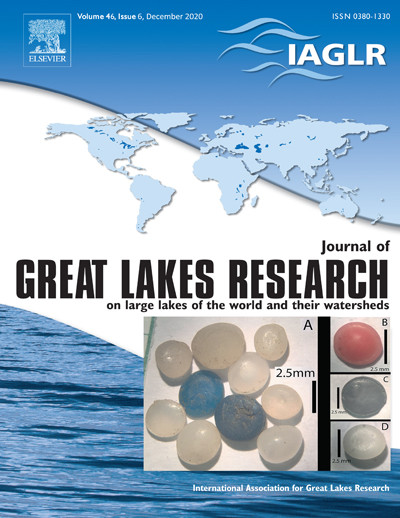JGLR 46(6) online; new associate editors
Dec 7, 2020
The Journal of Great Lakes Research, Volume 46, Issue 6 is now online. We welcome new associate editors Orlane Anneville (CARRTEL) and Mary Anne Evans (USGS GreatLakes Science Center).
REGULAR ARTICLES
- Using machine learning to model and predict water clarity in the Great Lakes
- Variations in water level, area and volume of Hongze Lake, China from 2003 to 2018
- Retrieval of ice/water observations from synthetic aperture radar imagery for use in lake ice data assimilation
- Three-dimensional bluff evolution in response to seasonal fluctuations in Great Lakes water levels
- Delineating spatial distribution and thickness of unconsolidated sand along the southwest Lake
- Michigan shoreline using TEM and ERT geophysical methods
- Estimation of phosphorus loads from septic systems to tributaries in the Canadian Lake Erie Basin
- Seasonal changes predominant over manure application in driving dissolved organic matter shifts in agricultural runoff
- Sources and scales of near-bottom turbulent mixing in large meromictic Lake Iseo
- Redox-related release of phosphorus from sediments in large and shallow Lake Peipsi: Evidence from sediment studies and long- term monitoring data
- Methane and nitrous oxide measured throughout Lake Erie over all seasons indicate highest emissions from the eutrophic Western Basin
- Seasonality and physical drivers of deep chlorophyll layers in Lake Superior, with implications for a rapidly warming lake
- Environmental exposure of freshwater mussels to contaminants of emerging concern: Implications for species conservation
- Spatial and vertical bias in down-looking ship-based acoustic estimates of fish density in Lake Superior: Lessons learned from multi-directional acoustics
- Spatial and temporal variations of Limnothrissa miodon stocks and their stability in Lake Kivu
- Determining habitat limitations of Maumee River walleye production to western Lake Erie fish stocks: documenting a spawning ground barrier
- Evidence of spawning by lake trout Salvelinus namaycush on substrates at the base of large boulders in northern Lake Huron
- Fatty acids reveal salmonine – prey relationships in Lake Michigan
- Risk-benefit modeling to guide health research in collaboration with Great Lakes fish consuming Native American communities
- Prevalence and distribution of Renibacterium salmoninarum in non-salmonid fishes from Laurentian Great Lakes and inland habitats
- What do our lakes mean to us? An understanding of Michigan coastline communities’ perceptions of the Great Lakes
- Thinking outside the ‘‘water box’’ in the Detroit River Area of Concern
- Local perceptions on the state of the pelagic fisheries and fisheries management in Uvira, Lake Tanganyika, DR Congo
SHORT COMMUNICATIONS
- Microplastic pollutants in the coastal dunes of Lake Erie and Lake Ontario
- Incorporation of anthropogenic debris into double-crested cormorant nests, Toronto, Ontario
- Consequences of calamities and their management: The case of COVID-19 pandemic and flooding on inland capture fisheries in Kenya
- Ontogenetic habitat use and seasonal activity of Nile crocodiles (Crocodylus niloticus) in the Lake Albert delta, East Africa
- Characterization of Cu/Zn-SODs in sympatric species: A comparison of zebra and quagga mussels
CORRIGENDUM
- Corrigendum to ‘‘Quantitative methods to reconstruct length and weight of Great Lakes prey fishes from dietary observations of partially digested prey’’ [J. Great Lakes Res. 45 (2019) 1228–1240]
ANNOUNCEMENTS
- New Associate Editor Orlane Anneville
- New Associate Editor Mary Anne Evans

The International Association for Great Lakes Research is a U.S. 501(c)(3) nonprofit organization.
© 2025 International Association for Great Lakes Research






